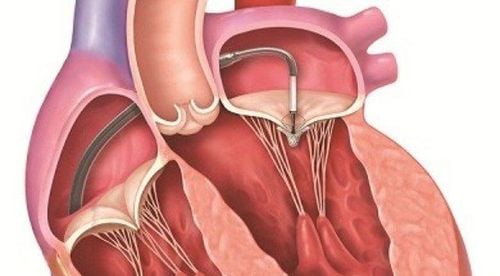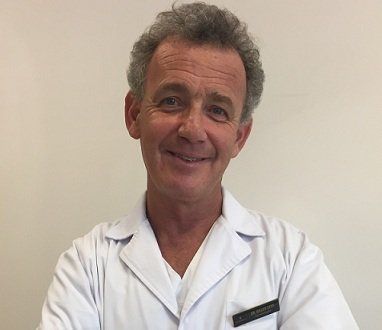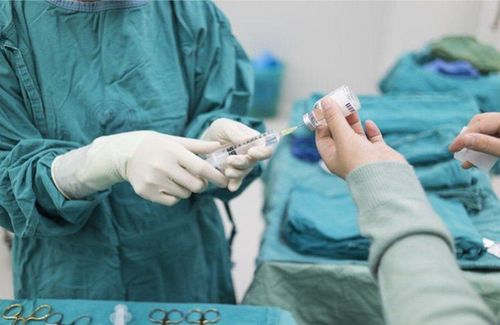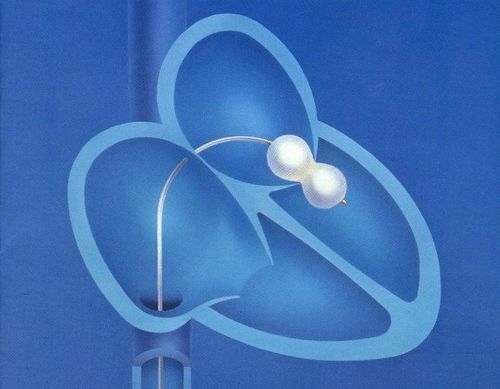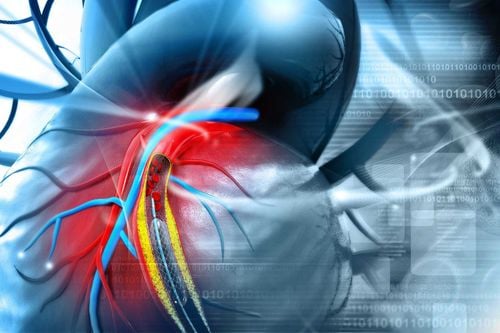This is an automatically translated article.
The article is professionally consulted by Master, Doctor Cao Thanh Tam - Cardiologist - Cardiovascular Center - Vinmec Central Park International General Hospital. Master - Doctor Cao Thanh Tam has many years of experience in the diagnosis and treatment of cardiovascular diseasesPercutaneous aortic valve replacement (TAVI) is one of the most complex cardiovascular interventions. The birth of the TAVI method has opened up hope for patients with aortic stenosis who have high risk factors and cannot undergo surgery.
1. What is percutaneous aortic valve replacement (TAVI)?
Aortic stenosis is a common cardiovascular disease today and has a high prognosis of mortality if left untreated. Before the advent of percutaneous aortic valve replacement (TAVI), the treatment of aortic stenosis was mainly with open-heart surgery to replace the valve. However, about one-third of these patients are contraindicated for surgery due to the high risks associated with surgery. The advent of percutaneous aortic valve replacement (TAVI) has opened up hope for patients with aortic stenosis who cannot undergo surgery. During the TAVI technique, a device with a valve attached is threaded through the skin, into the femoral artery, and raised to attach to the aortic valve.TAVI was first applied to patients with tight aortic valve stenosis in 2002 and was performed by interventional cardiologist Dr. Alain Cribier. This method has been officially and routinely applied for about 10 years now. This method is less invasive, simple, has a high success rate, is as effective as aortic valve replacement surgery and has a lower risk of complications. TAVI helps patients with less pain after surgery and less risk of infection than open heart surgery. TAVI also helps to shorten postoperative time and hospital stay compared to traditional methods. However, the cost to perform this method is still high and requires the patient to have anatomical structure of the aortic valve as well as appropriate access routes.
2. Percutaneous aortic valve replacement (TAVI) is indicated for whom?

Patients (>= 60 years old) with severe aortic stenosis (valve area < 1 cm2; mean transvalvular gradient > 40mm Hg), symptomatic and with a prognosis of >1 year survival. There are aortic and peripheral artery anatomy suitable for the method. Have a desire to perform TAVI. Approved by the “cardiology team” (including internal cardiologists, cardiologists, interventional cardiologists, anesthesiologists) approved.
3. Subjects are contraindicated with percutaneous aortic valve replacement?
The TAVI method is absolutely contraindicated in the following cases:When the medical facility does not have a “heart team” and a cardiac surgery unit on site. Patients not approved by the “cardiovascular group” had a prognosis of <1 year survival. Subjects are not able to improve quality of life because of other comorbidities. Other severe valvular disease associated with multiple valve replacement is indicated. Aortic valve ring <18mm or >29mm. Thrombosis in the left ventricle Progressive endocarditis. High risk of occlusion from the coronary artery: Coronary artery–aortic valve floor <10mm (risk of coronary foramen occlusion and complete atrioventricular block) Atherosclerotic plaque with mobile thrombus in the aorta ascending, aortic arch. Access via femoral artery: femoral artery or small iliac artery (d < 6mm) tortuous, severe calcification. Doctors will consider depending on the clinical characteristics of each patient to decide whether to proceed with TAVI method or not if the patient has the following relative contraindications:
No aortic valve calcification or 2-piece aortic valve. Have coronary artery disease requiring revascularization but not yet Hemodynamically unstable. LVEF < 20%.
4. How is percutaneous aortic valve replacement performed?
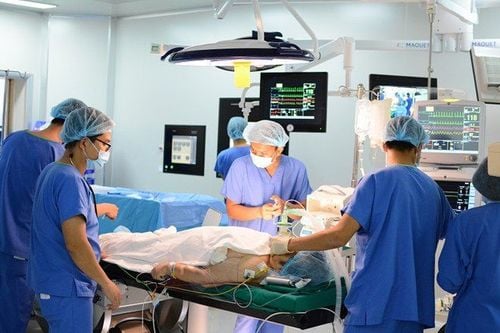
The patient will be performed laboratory tests (echocardiography (TEE and TTE), CT scan as well as other blood tests) to assess valve structure compatibility heart and blood vessels anatomically. Coronary angiography and aortic arch, access artery to assess the damage of the coronary system, the degree of calcification of the aortic valve as well as the vascular access. consent and appropriate indications for the patient. Explain to patients and relatives the indications, costs, possible complications before, during and after the procedure Perform the procedure. Percutaneous aortic valve replacement is a difficult procedure that requires a high level of technical expertise. In addition, this procedure must also be performed at reputable medical facilities with modern equipment to ensure patient safety during surgical anesthesia.
Vinmec International General Hospital is currently the only place in Vietnam that is equipped with a Hybrid room and advanced equipment such as DSA angiography machine, anesthesia machine with integrated patient hemodynamic monitoring software. In a strict manner, difficult and complex surgical methods can be performed, modern equipment brings the best image quality to the surgeon.
In particular, Vinmec International General Hospital is also the only address awarded the certificate of "independent aortic valve replacement" in Vietnam, and Prof. Dr. Vo Thanh Nhan is a cardiologist. The first interventional circuit was awarded the "Proctor" certificate in Vietnam. In addition, the hospital also has a "cardiology team" that works in unison, and at the same time supports the Cardiovascular surgeons to bring the best treatment results to patients.
In April & May 2021, when there is a need for cardiovascular examination and treatment at Vinmec Times City International Hospital and Vinmec Central Park, customers will enjoy double incentives:
- Free examination Specialty and 50% discount on many cardiology packages such as:
+ Basic Cardiovascular Screening Package
+ Hypertension Checkup Package
+ Heart Failure Checkup Package
+ Coronary Cardiovascular Examination Package
+ Full Cardiovascular Examination Package
- Reduce 50% of costs for customers who have indicated treatment after examination. The program is limited to the corresponding technique of each hospital and to customers who perform this treatment technique for the first time at Vinmec.
Please dial HOTLINE for more information or register for an appointment HERE. Download MyVinmec app to make appointments faster and to manage your bookings easily.





